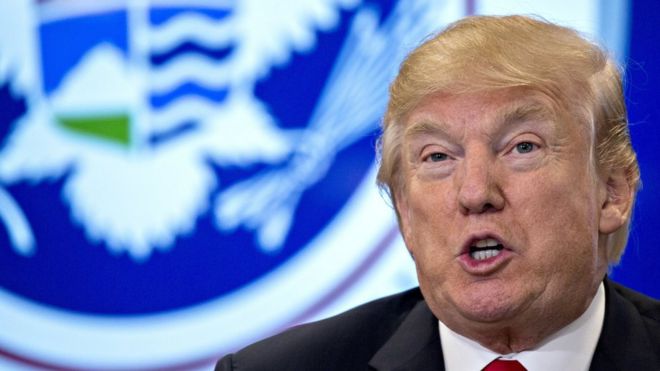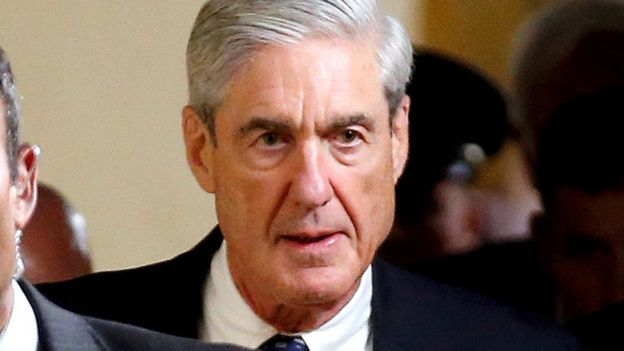
Senior Democrats have warned President Donald Trump not to use a controversial memo as a "pretext" to fire the special counsel investigating alleged Russian involvement in the US election.
They warned that such action could trigger a constitutional crisis not seen since the Nixon era.
The memo, written by Republicans, accuses the FBI of abusing its powers.
President Trump approved the declassification of the memo and said it revealed a disgraceful story.
It accuses the FBI and the justice department of using an unsubstantiated and Democratic-funded report to obtain the warrant that gave permission to spy on an aide to Mr Trump.
Democrats said the release of the memo was aimed at disrupting investigations into alleged links between the Trump campaign and the Kremlin. President Trump has consistently denied any such collusion.
The FBI had warned against the memo's release and said key facts had been omitted.
What have Democrats said?
Democrats say the memo, released on Friday, is a "shameful effort to discredit" the FBI and inquiries into Russian meddling.
In a statement, Senate Minority Leader Chuck Schumer, House Minority Nancy Pelosi and eight other senior Democrats warned Mr Trump against trying to sack special counsel Robert Mueller or the deputy attorney general, Rod Rosenstein.
"We write to inform you that we would consider such an unwarranted action as an attempt to obstruct justice in the Russia investigation," the statement said.
They said such action could result in a constitutional crisis not seen since the 1970s when then President Richard Nixon gave orders to fire justice officials involved in the Watergate scandal.
The White House later said "no changes" would be made at the Department of Justice and Mr Rosenstein was fully expected to continue in his job.
What is in the memo?
It focuses on the court-approved wiretapping of Carter Page, a foreign policy adviser to the Trump campaign who was put under electronic surveillance by the FBI.
But the memo accuses the FBI and the justice department of using unsubstantiated evidence to obtain the October 2016 warrant.
It says that they did not tell the authorities their claim to the warrant was partially based on a dossier funded in part by the rival campaign of Hillary Clinton.
It also says that the author of that dossier, a former British intelligence agent called Christopher Steele, told a senior justice department official that he was "desperate" that Donald Trump should not win the vote.
 |
| Special Counsel Robert Mueller is leading the inquiry into alleged Russian interference in the US election |
The Democrats have drafted their own 10-page rebuttal memo, which is said to show that the FBI was more forthcoming with the surveillance court than the Republicans say.
According to unnamed officials quoted by US media, the FBI and justice department did tell the court that information it had received from Mr Steele was politically motivated.
One official told the Washington Post that the Department of Justice made "ample disclosure" to the court of facts that revealed "the research was being paid for by a political entity". However, the FBI did not say the dossier was financed by Democrats, sources told the New York Times.
The White House said President Trump "would be inclined" to release the Democrats' memo, as long as it has been reviewed for security purposes.
What have Republicans said?
Republicans who support the release of their own memo say it exposes malpractice and political bias within the FBI and justice department.
Mr Trump said a lot of people should be "ashamed of themselves" when asked about its contents.
Earlier on Friday the president accused top officials of politicising FBI and justice department investigations to damage his Republican party.
Devin Nunes, who commissioned the memo, has said it shows "serious violations" of public trust and he hopes it will trigger reforms.
Mr Page said he would use the memo in upcoming legal action against the justice department.
But not all Republicans supported the release of the memo.
Senator John McCain accused his party colleagues, and Mr Trump, of playing into the hands of Russian President Vladimir Putin.
"Our nation's elected officials, including the president, must stop looking at this investigation through the warped lens of politics and manufacturing partisan sideshows," he said in a statement.
"If we continue to undermine our own rule of law, we are doing Putin's job for him."
What other reaction has there been?
Former FBI Director James Comey, who was fired by President Trump in May, tweeted that the memo was "dishonest and misleading" and would negatively impact intelligence agencies' ties to the Foreign Intelligence Surveillance Act (Fisa) court system.
The current director, Christopher Wray, in an email to staff, said: "Talk is cheap; the work you do is what will endure.
"I stand by our shared determination to do our work independently and by the book. I stand with you," he said.

Analysis: Bomb or dud?
By the BBC's North America reporter Anthony Zurcher
Whether the Republican-generated document is as explosive as it had been made out to be depends on how one views the now-infamous Christopher Steele dossier and whether one believes the memo's assertion that it was an "essential part" of the Carter Page Fisa warrant's approval - or if there was other pertinent information the Republican memo-writers omitted.
The memo makes the case that the Fisa judge should have been told about information about Steele that could call his objectivity into question - including his expressed views about Donald Trump, his contacts with the press and the fact that his investigation was funded, in part, by Democratic Party interests.
Would such a disclosure have been enough to make the Page warrant request one of only a handful of the tens of thousands of Fisa applications that have been rejected by judges since the system was set up in 1978? And is the surveillance of Page - who had drawn the attention of US intelligence services as far back as 2013 - enough to call into question the entire Russia investigation, which had been initiated months before the warrant was approved?
The answers to those questions will determine whether the memo was a bomb or a dud.
Source: BBCNews

No comments:
Post a Comment
Add a Comment...